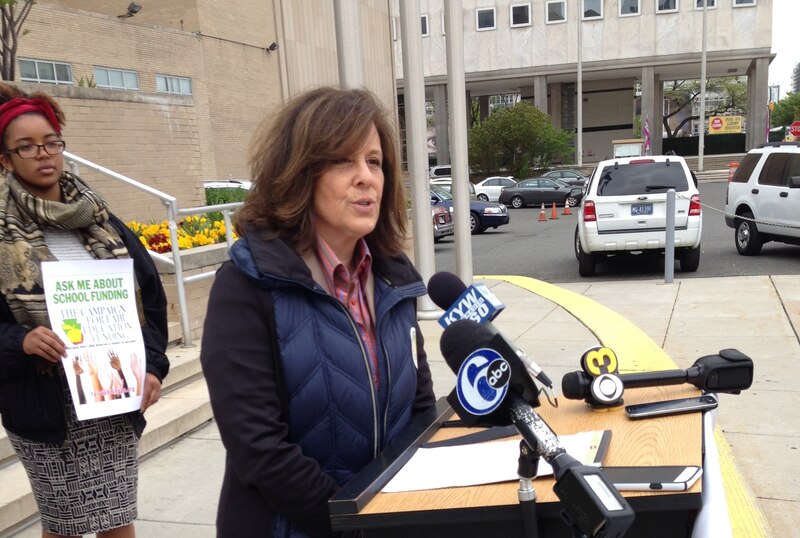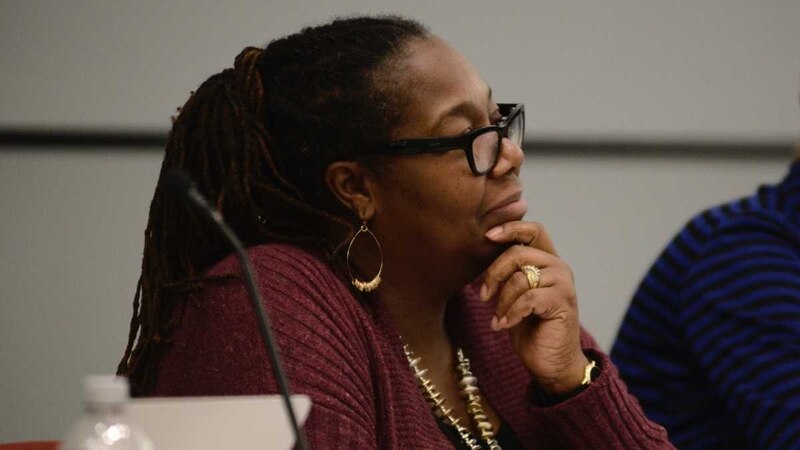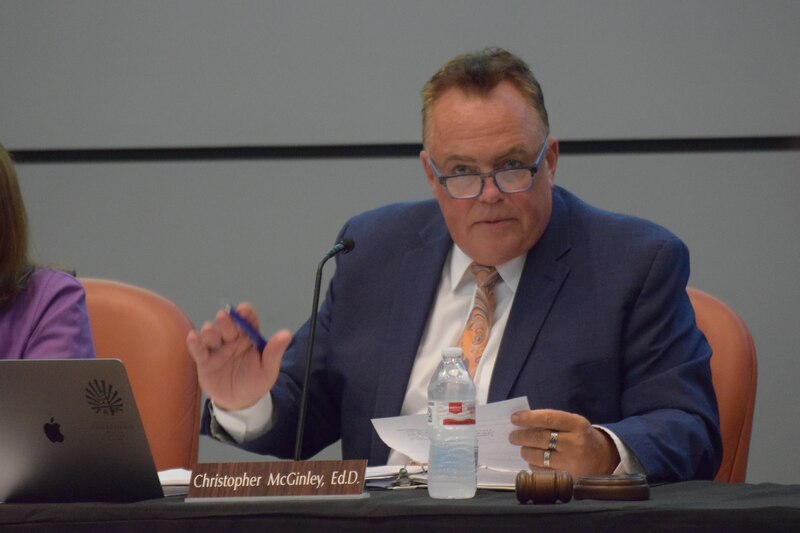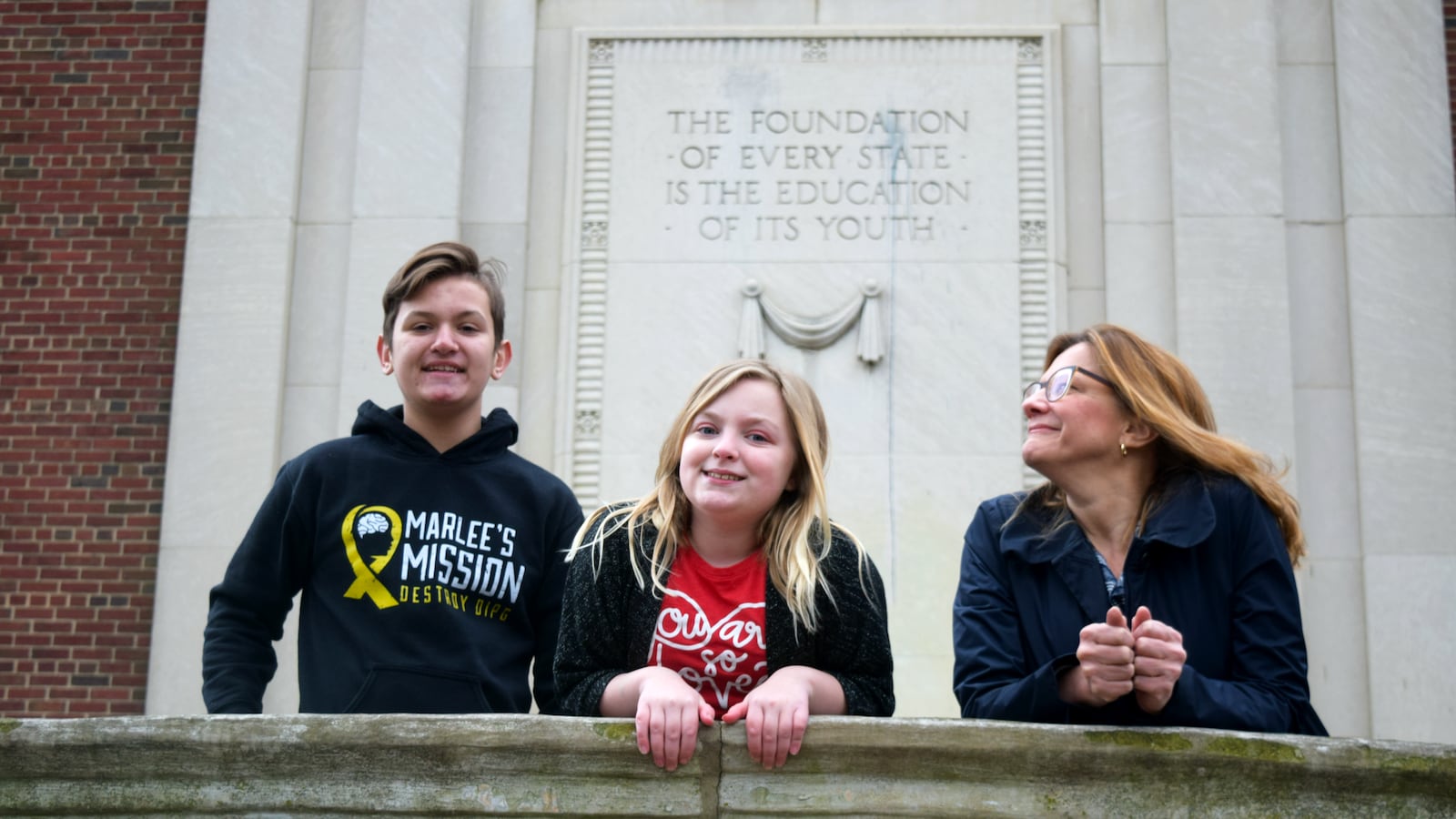This article was originally published in The Notebook. In August 2020, The Notebook became Chalkbeat Philadelphia.
In May 2018, the School Reform Commission in Philadelphia was considering an application to start Philadelphia Hebrew Public Charter School, in the East Falls section of the city.
Bonnie Emilius, a parent in the neighborhood with experience sending her children to other charter and private schools, opposed it. She feared that the school would drain students and resources from Thomas Mifflin, the public elementary school in East Falls, which she says has been wonderful for her kids.
At one point, Emilius was the board president of a charter school, but she has since soured on the charter sector.
“Your child is a dollar sign to charter schools,” said Emilius, who was once with Green Woods Charter School in nearby Roxborough. “They need to keep their enrollment full to meet their budget, and that’s the bottom line. … I’m not against the individual people. I’m against the model of charter schools.”
Before the vote, the SRC also seemed skeptical of Hebrew Public Charter’s application.
SRC Chair Estelle Richman was concerned about the decision, saying the school was not the type that the city should prioritize, especially in light of the District’s precarious financial position.
But, ultimately, she gave her blessing, and the application was approved.
“To preserve our control, I will vote to approve this charter,” Richman said.
She was referring to the lengthy appeals process in Pennsylvania for charter schools rejected by local boards of education.
When the state charter law was passed in 1997, it created a seven-member Charter Appeal Board, known as CAB, that would be the arbiter for charters either initially denied or ordered to close by local districts.
For years, the process has given many school board members, like Richman, pause when considering charter applications.
Lately, though, with major changes taking place on the boards of the state’s two largest urban districts, a new attitude about the CAB seems to be emerging.
This year, the Philadelphia Board of Education, whose installation in July marked the return of city schools to local control, showed a different face than that displayed by the SRC for much of its 17-year reign, especially in its final years.
In February, citing stricter authorizing standards and flawed proposals, the school board rejected all three of the charter applications it received this year.
In 2015, a new school board was elected in Pittsburgh on a progressive platform with an anti-privatization plank. Since then, it has also rejected all three of the charter applications it has received.
These changes in how school boards interpret the charter law could carry a lot of weight in the ever-present debate between supporters of traditional public schools and supporters of charters.
In Philadelphia, charters make up about a third of public school students and the budget. In Pittsburgh, both are about 15 percent.
Whether those numbers go up, down or stay the same has a lot to do with how the school boards interact with the CAB. Right now, the panel’s ranks are filled with holdover members whose terms have long expired.
Despite winning election in 2014 largely by opposing former Gov. Tom Corbett’s education policies, Gov. Wolf has made no appointments to the appeals board, whose seats — with one vacancy — are still filled by Corbett appointees.
Members have connections to charter or Catholic schools. Advocates are circulating a petition calling on Wolf, a Democrat, to halt all proceedings of the CAB until he names his own appointees, who must be approved by the Republican-controlled State Senate.
Asked about new appointments to the CAB, Wolf spokesman J.J. Abbott said: “We continue to negotiate with the Senate on resolving this issue and getting new members on the board.”
School board members in Philadelphia, Pittsburgh, and Harrisburg contend that the CAB’s reading of the law is too narrow, and this, advocates say, has led it to overturn denials of unworthy charter applications.
Charters are most popular in districts that are financially distressed, which has raised a crucial question: Is the CAB now out of touch with the attitudes of taxpayers and parents, or is it a necessary arbiter for school choice advocates whose main avenue of expansion is in increasingly progressive cities?
Different interpretations
The debate about Pennsylvania’s Charter Appeal Board comes down to an interpretation of the state’s decades-old charter school law.
Critics of the current CAB say the body sets too low a bar for approval.
“As long as you meet that minimum, even if a school is not likely to demonstrate it can operate [as a successful school] at that minimum, [the CAB feels] obliged to approve the charter in front of them,” said Donna Cooper, executive director of Public Citizens for Children & Youth, which has called for the moratorium until a more “balanced” CAB is in place.
The current makeup of the CAB “doesn’t encourage them to explore the full purview of the law to make sure taxpayers, parents, students, and the local board is protected,” she said.

Donna Cooper speaks at a press conference outside school district headquarters.
Chris McGinley, a member of both the new Board of Education and the former SRC, agrees that the CAB should take a more “big-picture view” that includes the needs of school districts as a whole. In order to get his vote, a charter application must offer something innovative and have a budget and staffing model that can realistically accomplish the application’s vision while ensuring that all demographics of children receive the services they are entitled to under the law.
“I think innovation is in the law, and there’s evidence of charter schools doing that successfully,” he said. “These last three applications had some unique ideas, but they weren’t fully developed into a coherent package.”
Board President Joyce Wilkerson, who was also on the SRC, said it is also important to consider the “past performance” of a charter operator “if an operator has been failing or struggling with its other schools.”
Mark Zacarelli, who serves as counsel to the CAB, did not return phone calls seeking comment.
Local history
Philadelphia’s public school history is unique among districts in the state. The School Reform Commission took over the District when the state seized control in 2001. Republican Gov. Mark Schweiker declared it financially and academically distressed and created the five-member SRC, giving the gubernatorial appointees a controlling interest in the new body.
Because of the state’s direct involvement in the SRC, it was exempted from CAB oversight, and a great number of the charters in Philadelphia that exist today were approved between 2001 and 2007.
“Under the SRC, there was enthusiasm for expanding charters,” McGinley said. He added that Philly was a “good environment” for anyone looking to open a charter. “And certainly, the leadership of the School District was a part of expanding that model under the SRC.”
In 2007, when Gov. Ed Rendell, a Democrat, made his first appointments to the SRC, the body essentially stopped considering new charter applications.
That changed in 2014.
Just before that year, Rendell’s successor, Corbett, a Republican, did not replace expiring federal stimulus aid with state aid and he made other cuts to education, including money that helped districts defray the added cost of charter schools.
Amid the budget crisis that followed, the School District of Philadelphia underwent a series of cutbacks, including sharp reductions to guidance counselors and school nurses.
In 2014, trying to raise more money locally for schools, city government sought to impose a local tax on tobacco.
But that tax required added approval from the state legislature, where Republicans were in control. As a condition for allowing Philadelphia to impose the tax, the state legislature took away the SRC’s exemption from the charter appeals process – effectively requiring the SRC to vote on new charter applications every year.
With the floodgates opened, Philadelphia received 39 charter applications in 2014, and the SRC approved six. From 2015 until its dissolution last summer, the SRC has approved almost a third of applicants each year — 10 of the 32 that applied in total.
The SRC rejected many of them outright, “calling balls and strikes based on the merits of the application,” according to former School Reform Commissioner Bill Green.
But for some, like Hebrew Public, where concerns didn’t seem to rise to the level of complete rejection, the SRC imposed conditions. This step was made, in part, to avoid those schools appealing to the state if they had been rejected.
The SRC also used this tactic on some charters up for renewal. Many charters, though, would not agree to the conditions, and 25 have been operating without signed charter agreements for years. Only a minority of unsigned charters with conditions would close if the conditions’ goals are not met. Most conditions were offered to correct violations of state and federal education laws.
Although it’s unpopular with the charter community and has spawned legal action, this approach had mostly kept Philadelphia away from the Charter Appeal Board.
But with Philadelphia’s new school board now in place, the landscape has changed.
The board’s nine members were appointed by Mayor Kenney. A Democrat elected in 2015 with lots of support from organized labor, including the teachers’ union, Kenney faced his stiffest opposition in the primary. There, he defeated a field of challengers that included State Sen. Anthony Hardy Williams, who was heavily backed by wealthy proponents of school choice.
Kenney’s board includes three members who have ties to the charter sector, and the mayor himself once sat on the board of a Center City charter. But his priorities as mayor have adopted strategies favored by supporters of traditional public schools. His key K-12 education initiative has been the creation of “community schools,” which make schools the hub of social services and other neighborhood activities, with a focus on alleviating poverty.
For Philadelphia charter supporters such as former SRC Commissioner Sylvia Simms, this makes the CAB an especially important and necessary arbiter when Kenney’s board considers charter applications and renewals.
“It’s important to have an appeals board,” said Simms, who served on the SRC from 2013 to 2016. “I think it needs to be a separate entity, because the [District’s charter school office] serves the school board, and the school board is appointed by the mayor. I think it needs to be a neutral party that doesn’t have a stake in this either way.

Former School Reform Commissioner Sylvia Simms listens to testimony during her time on the SRC. (Bastiaan Slabbers/for WHYY)
“It doesn’t matter who’s there, whether they’re appointed by Corbett or Wolf. If people there are doing right by the families, then it doesn’t matter.”
Pittsburgh clashes with the CAB
In the same year that Kenney won power in Philadelphia, a school board election in Pittsburgh also proved momentous in local education policy.
In the run-up to 2015, the Pittsburgh school board voted to open new charters and close 22 public schools.
In response, groups backing traditional public schools, including One Pennsylvania, successfully helped four new candidates win seats on the board.
The new group reversed the most recent decision to close more public schools and denied three new charter applications, pitting it against the CAB.
“Our platform was anti-privatization, and the solution to that is community schools, ending the school-to-prison pipeline, investing more in early education,” said Angel Gober, a Pittsburgh public school mother and an organizer for One Pennsylvania.
Before the new board took power, seven charters appealed denials of applications or decisions to begin closure, but only two were successful. Now the new board finds itself before CAB more often, and it’s been losing.
“We have essentially been forced into most expansions or renewals due to the weak charter law in Pennsylvania,” said board member Moira Kaleida, a parent who was elected in 2015. “Until we fix the legislation and policies, we will be stuck in this awful cycle.”
Kaleida said she won’t vote against all new charter schools, and she has approved renewals and an expansion for existing charter schools.
“When these charter schools have the transparency and accountability that public schools have and can provide the same services and are actually innovative, we will approve,” she said. “None so far have actually offered anything new or innovative.”
Gober is frustrated with the role that the CAB filled with Corbett appointees has played.
“Charter people are not worried about the school board because they’ll go to the Charter Appeal Board and get the votes they need,” Gober said. “I’ve had [charter school staff] say to me that the school board doesn’t matter, because we’ll just appeal to the state.”
Pittsburgh’s new school board has voted down three new applications. For Catalyst Academy, the school board cited, in part, no accommodations for special education students. Imani Academy left references in its curriculum to religious education — a curriculum that seemed copied and pasted from its private religious school, Imani Christian Academy. The Career Technical Charter would have duplicated a CTE program that already exists in Pittsburgh.
Pittsburgh’s denial of Catalyst Academy was recently overturned by the CAB in a 3-2 vote. Career Technical’s appeal is pending, and Imani has threatened to appeal but has not yet filed the required petition.
Gober’s concerns are exacerbated by a state appeals board that she sees as biased in favor of charters.
“Tom Corbett was on the list to testify on behalf of Imani Academy” before the vote by Pittsburgh’s school board, Gober said. “He called the District and canceled the day of. If Tom Corbett was endorsing Imani, he probably laid out the red carpet and told the school to go to the appeals board — those are his people. They’re just going to vote to overturn our vote.”
Politics of public education in Harrisburg
Harrisburg has three charter schools. The city’s school district is much smaller than Philadelphia’s, but they have something in common – being labeled financially distressed.
Danielle Robinson was first elected to Pittsburgh’s board in 2012, at a time when she described it as lenient towards charter schools. But that changed in the ensuing years, and Robinson was elected school board president in 2016.
In Robinson’s time there, the board has had nine charter schools apply and two have been approved. She votes against any charter offering “redundancies.” Robinson voted to approve the Capital Area School for the Arts because Harrisburg does not have an arts school and can’t afford to create one.
“I will vote for a charter if it gives our children something we can’t provide,” she said.
In recent years, the rate of applications for new charters in Harrisburg has slowed. Robinson said the board’s high standard for approving new applications sent a message to charters throughout the state.
“We were getting these ridiculous applications that had nothing to do with education and were just going to siphon money from the school district,” Robinson said. One was a photocopy of a charter application that was written for Chicago, where it was denied. Another was first denied by the York school board, which asked the applicants to revise the application to comply with the charter law. Instead, the group submitted the same application to Harrisburg, where it was turned down again.
“The charters got embarrassed because our attorneys and administrative team tore these applications to shreds,” Robinson said. “They know it’s really tough out here to get approved.”
The school board unanimously denied Pennsylvania STEAM Academy Charter School last month. Carolyn Dumaresq leads the group behind the charter application, and she intends to appeal to the state instead of revising the application. As the acting Secretary of Education from 2013 to 2015, Dumaresq herself chaired the Charter Appeals Board, alongside each of the current members.
“If the Charter Appeal Board votes in their favor, I think it will be extremely telling to the people of Harrisburg,” Robinson said. “I don’t care who you are. If your application is substandard, we will deny it. I don’t care about the outside political pressure. We will not be bullied into giving them a charter.”
Fighting over school closures
A common gripe about the charter authorization process is how long it takes to close a school.
In Philadelphia, McGinley lays the blame on the state’s charter law.
It is “completely irresponsible that it could take so many years to close a charter school,” he said.
Wilkerson, Philadelphia’s school board president who had previously chaired the SRC, called the process “ridiculous.”
The protracted appeals procedure that goes through the CAB “doesn’t work,” she said. “It doesn’t serve the needs of children. It doesn’t serve the charter schools. After we take a non-renewal vote, financing becomes difficult for a school. Families don’t want to enroll. It’s a process that takes far too long and is very expensive.”
She said that the current makeup of the CAB “doesn’t function in a way that is sufficiently responsive to our needs in Philadelphia.”
McGinley was sometimes the sole dissenting vote in decisions to approve charter schools when he served on the SRC. A former Philadelphia teacher and principal who went on to become a suburban superintendent, he pointed out that charters are authorized for five-year terms, but take years to shut down due to appeals.
Pocono Mountain Charter School, for instance, was able to delay closure for six years.
“Charters are not easily closed down when they’re unsuccessful or even unsafe for kids,” McGinley said.
“The moment of approval is the critical event in the life of the school and the city, because we’re not making a five-year commitment; in most cases, we’re making a commitment that has no sunset,” he added, explaining his standard for approval. “So once we approve, we are asserting that this is money well spent, this school is great for children, and to some extent, it’s a better alternative to the programs we’re offering in the District.”

School board member Chris McGinley speaks at the first hearing of the new board in July 2018 (Photo: Greg Windle)
Charters can also prolong the closure process by appealing to the court system. And critics point out that they can pay the legal fees out of tuition dollars received from the local school district, which must continue to reimburse charter schools for enrolled students during appeals.
Sources familiar with the process say that some charters doomed for closure are persuaded to appeal by lawyers seeking fees.
But what’s the alternative to this multi-layered appeals process?
Charter proponents defend the need for independent oversight of school board decisions.
“A well-structured appeals process creates a fair system for charter applicants and holds authorizers accountable for making sound, merit-based decisions,” said Kristen Forbriger, vice president of external relations for the National Association of Charter School Authorizers. “In jurisdictions where there is only one authorizer, the appeals process also creates an important pathway to opening schools in the face of a hostile authorizing body.”
Abolishing the appeals process “would only move these decisions to the courts, where judgments would be made solely on procedure — whether an applicant followed the proper process — rather than the substance of the proposal and its merits,” she said.
The effects of that vote in May 2018 to approve Philadelphia Hebrew Public Charter are still playing out in East Falls.
The school is set to open in September, and many neighbors like Bonnie Emilius are still wary of what the change will mean for Mifflin Elementary.
If parents decide to transfer their children, will that force budget cuts that will undercut community efforts to improve Mifflin?
Hebrew Public operates several schools in New York City and has a mission to attract a diverse group of students, teach them Hebrew, and prepare them to be “global citizens.” A board member said it could not provide any parents to interview until the Philadelphia school opens, and that it is not actively recruiting in East Falls.
The East Falls Community Council asked the Friends of Mifflin to campaign against Hebrew Public Charter School locating in the neighborhood. But, as president of the Friends group, Emilius declined. She wants Mifflin’s message to be “positive.”
“At Mifflin, your kids will receive a phenomenal education by well-trained teachers,” she said. “Parents will have to make their own decisions.”

